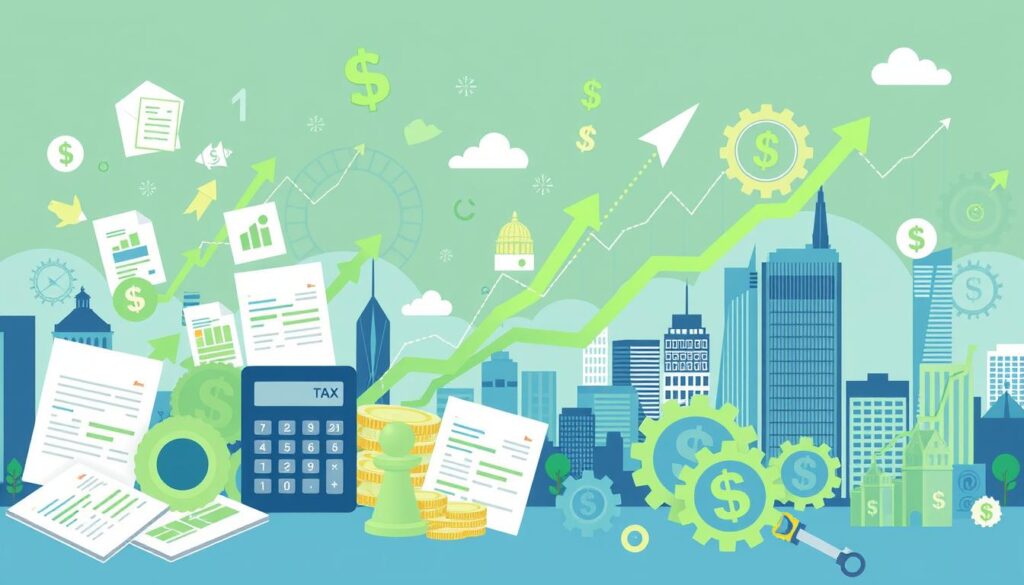
Preparing your taxes can feel overwhelming. But, with the right strategies, you can cut down your tax bill and save more. This guide will show you expert tax optimization techniques. You’ll learn how to use legal and ethical ways to save money on taxes.
Whether you’re an individual or a business owner, this article will help you. We’ll cover topics like maximizing deductions and using retirement accounts. You’ll learn how to make the most of the tax code and follow the latest rules.
Key Takeaways
- Discover expert tax optimization strategies to maximize your savings
- Learn how to leverage legal and ethical tactics to reduce your tax liability
- Explore tax-saving opportunities through deductions, charitable contributions, and investment strategies
- Understand the importance of tax planning and staying informed on the latest tax law changes
- Gain insights on when to seek professional tax advice for optimal results
Understanding Tax Optimization
Tax optimization is about legally cutting down your tax bill. It means planning ahead to pay the least taxes possible. You use deductions, credits, and strategies to keep more money and invest in your future.
What is Tax Optimization?
Tax optimization is like tax planning on steroids. It’s about using every legal way to lower your taxes. This includes claiming deductions, using credits, and organizing your finances wisely. The aim is to pay the least taxes while following the law.
Importance of Tax Planning
Good tax planning is key to financial success. Tax planning benefits include more cash flow and better investment chances. It helps you meet your financial goals by managing your taxes well.
- Reduce your tax burden and keep more of your income
- Identify eligible deductions and credits to lower your taxable income
- Align your tax strategy with your broader financial objectives
- Prepare for tax law changes and stay compliant with regulations
“Effective tax planning is the cornerstone of financial success. By proactively managing your tax obligations, you can unlock significant savings and position your finances for long-term growth.”
Maximizing Tax Deductions
One of the best ways to lower your taxes is to use all the deductions you can. This includes business costs, medical bills, and donations to charity. We’ll show you how to claim every deduction you’re allowed to. This way, you can keep more of your money.
Deductible Business Expenses
If you run a business or work for yourself, you can deduct many expenses. These tax deductions include things like rent, utilities, and office supplies. You can also deduct part of your car costs. Keeping track of these deductible expenses helps you save on taxes.
Medical and Healthcare Deductions
Medical bills that are more than a certain part of your income can be deducted. This includes doctor visits, medicines, and travel for medical reasons. By claiming these deductible expenses, you can lower your taxes even more.
Charitable Contributions
Donating to charity has two benefits. It helps those in need and can also lower your taxes. Make sure to keep records of your donations. A tax expert can help you make sure you’re getting the most from your donations.
| Tax Deduction | Deductible Expense | Tax-Deductible Item | Tax-Saving Strategy |
|---|---|---|---|
| Business Expenses | Rent, utilities, supplies | Reduce taxable income | Carefully track and document expenses |
| Medical Expenses | Healthcare, medications, mileage | Deduct expenses exceeding a percentage of AGI | Maximize eligible medical deductions |
| Charitable Contributions | Monetary donations, volunteer work | Reduce taxable income | Keep detailed records of donations |
Learning about and using different tax deductions can save you a lot of money. It’s important to talk to a tax expert. They can help you make sure you’re getting all the deductions you’re allowed.
Charitable Contributions: A Win-Win Strategy
Charitable giving is a strong tool for tax optimization. Knowing what donations qualify and how to document them helps you get the most tax benefits. This way, your giving can help both your wallet and the causes you support.
Qualifying Donations
To get tax deductions for your donations, they must go to recognized non-profits. This includes 501(c)(3) charities, religious groups, or government bodies. Donations can be cash, assets, or even items you give away. Keeping good records of your giving is key to claiming the most deductions.
Donation Tracking and Documentation
- Keep records of all cash donations, including the date, amount, and the name of the recipient organization.
- For non-cash donations, like clothing or household items, get a written acknowledgment from the charity. It should include a description of the items and their fair market value.
- If you donate appreciated assets, like stocks or real estate, document the purchase price, the date of acquisition, and the fair market value at the time of the donation.
- Use donor-advised funds or “bunching” strategies to optimize the timing and amount of your charitable deductions.
By being organized and focused on your charitable tax optimization, you help your favorite causes. You also get valuable tax benefits for yourself and your family.
“Charitable giving is not just about the heart, but also the head. By aligning your donations with your tax strategy, you can create a win-win situation for both your chosen causes and your wallet.”
Tax Optimization for Investments
As an investor, making your portfolio tax-efficient can greatly boost your returns. Knowing how to use tax-efficient strategies can help you keep more of your money. This way, you can enjoy the fruits of your investment efforts more fully.
Tax-Efficient Investment Strategies
Using tax-advantaged accounts like 401(k)s and IRAs is a smart move. These accounts let your investments grow without being taxed right away. This means you pay less in taxes now and could have more wealth later.
Managing capital gains tax and dividend tax wisely is also key. When you invest, timing and how you structure your deals matter a lot. By selling at the right time and handling dividends smartly, you can cut down on taxes.
Spreading your investments across different types can also help with taxes. For example, using tax-efficient index funds or ETFs can offer broad exposure while keeping taxes low.
“Aligning your investment decisions with tax-optimization principles can help you maximize your returns and keep more of your hard-earned money.”
By applying these tax-efficient investment strategies, you can lower your taxes and grow your portfolio better over time.
Retirement Account Strategies
Retirement accounts like 401(k)s and IRAs are key for retirement tax optimization. We’ll look at the differences between traditional and Roth IRAs. We’ll also talk about how to use these accounts to lower your taxes now and in retirement.
Traditional vs. Roth IRAs
Traditional and Roth IRAs differ in how they’re taxed. Traditional IRAs let you save on taxes now because you contribute before taxes. But, you’ll pay taxes on withdrawals later.
Roth IRAs, on the other hand, let you contribute after taxes. This means you won’t pay taxes on withdrawals in retirement. Your choice depends on your current and future tax brackets.
If you think you’ll pay less in taxes later, a Roth IRA might be better. It lets you pay taxes now at a lower rate. If you think you’ll pay more in taxes later, a traditional IRA could be better. It lets you delay taxes until you withdraw.
It’s crucial to make the most of your IRA contributions and withdrawals. You can plan your Roth IRA conversions or use IRA contribution limits and income thresholds. This helps you minimize your IRA tax strategies.
Understanding traditional and Roth IRAs can help you save for retirement. By using 401(k) tax planning and other pension tax minimization strategies, you can save more and pay less in taxes now and later.
Business Tax Optimization Strategies
As a business owner, dealing with taxes can be tough. But, with the right strategies, you can save a lot and lower your taxes. We’ll look at small business tax optimization and corporate tax planning methods to help you keep more profits.
Maximizing business deductions is a key strategy. This means using expenses like office supplies, equipment, travel, and home office costs to your advantage. By keeping track of these, you can lower your taxable income and save more money.
Choosing the right tax-efficient business structure is also crucial. Whether you’re a sole proprietor, partnership, or corporation, your structure affects your taxes. A tax professional can help pick the best setup for your business.
Using tax credits is another smart way to optimize your business taxes. These credits can be for things like research and hiring qualified employees. By knowing about these credits, you can lower your taxes and put that money back into your business.
For corporate tax planning and small business tax optimization, you need a proactive plan. By understanding deductions, credits, and structures, you can create a tax strategy that fits your business goals. This will help you achieve long-term financial success.
“The key to successful business tax optimization is to stay informed, plan ahead, and work closely with tax professionals who can guide you through the ever-changing landscape of tax laws and regulations.”
| Tax Optimization Strategy | Benefits |
|---|---|
| Maximizing Deductible Expenses | Reduces taxable income and increases cash flow |
| Choosing the Right Business Structure | Minimizes tax liabilities based on your business model |
| Leveraging Tax Credits | Directly reduces the amount of taxes owed |
Tax Optimization for Homeowners
As a homeowner, you can save a lot of money on taxes. You can use the mortgage interest deduction and property tax deductions. Knowing about these benefits is key to saving more.
Mortgage Interest Deduction
The mortgage interest deduction is a big tax advantage. It lets you deduct the interest on your mortgage. This can lower your taxes and keep more money in your pocket.
Property Tax Deductions
Homeowners can also deduct property taxes. This includes taxes on your main home and any other properties. Keeping records of your tax payments can help you get the most from this deduction.
| Tax Benefit | Deduction Limit | Eligibility |
|---|---|---|
| Mortgage Interest Deduction | $750,000 ($375,000 if married filing separately) | Interest paid on a mortgage for your primary residence or a second home |
| Property Tax Deduction | $10,000 ($5,000 if married filing separately) | Property taxes paid on your primary residence and/or additional properties |
By using these tax deductions, homeowners can save a lot on taxes. Talk to a tax expert to make sure you’re getting the most savings. This way, you can keep more of your money.
Estate Planning and Tax Optimization
Effective estate planning is key to tax optimization. It helps you reduce estate tax and smoothly transfer wealth to your heirs. We’ll look at ways to handle inheritance tax rules and keep your assets safe with trust tax strategies and wealth transfer tax minimization.
Trusts are a powerful tool in estate planning. They can lower your taxable estate, letting you pass more wealth to your family. By setting up your trust carefully, you can cut down on estate tax and make sure your assets go where you want.
Strategic gifting is another smart move. Using annual gift tax exemptions and lifetime exclusions, you can give wealth to your heirs. This reduces your inheritance tax and lets you see your loved ones benefit from your gifts while you’re still alive.
| Estate Planning Tool | Tax Optimization Benefit |
|---|---|
| Trusts | Reduction in taxable estate, estate tax minimization |
| Strategic Gifting | Reduction in inheritance tax burden, wealth transfer tax minimization |
With a solid estate tax optimization plan, you can make sure your wealth goes to your loved ones efficiently and with less tax. Talk to a financial or estate planning expert to find the best trust tax strategies and inheritance tax planning for you.
Tax Optimization for Freelancers and Gig Workers
As a freelancer or gig worker, dealing with taxes can be tough. But, with smart strategies, you can lower your taxes and keep more money. We’ll look at deductible business expenses and tax-saving tips for freelancers and independent contractors.
Deductible Business Expenses
Being a freelancer or gig worker has a big perk: you can deduct many business expenses from your taxes. These include:
- Office supplies and equipment
- Utilities and internet expenses
- Vehicle expenses for business-related travel
- Professional development and training costs
- Dues and subscriptions for industry-related organizations
- Home office expenses, if you use a portion of your home exclusively for your business
By keeping track and documenting these expenses, freelancer tax optimization and gig worker tax planning become key to your financial plan.

Also, self-employment tax minimization is vital for freelancers and independent contractors. By maximizing contributions to tax-advantaged retirement accounts, like a Solo 401(k) or SEP IRA, you can lessen your independent contractor tax load.
By staying informed and proactive about deductions and strategies for freelancers and gig workers, you can make the most of tax optimization. This ensures you’re benefiting from your flexible work setup.
Tax Optimization
Taxes can be hard to understand, but smart strategies can help you save money. We’ll look at a complete way to comprehensive tax optimization. This method combines different tactics into a plan that fits your life.
Success in tax optimization comes from regularly updating your plan. Your money situation and goals can change, so it’s key to keep up. By being proactive and taking a holistic tax planning approach, you can make sure your tax savings match your long-term plans.
Whether you own a business, a home, or work as a freelancer, using insights from before can lead to big tax savings. By using deductions, credits, and smart investment and retirement planning, a good integrated tax strategy can boost your financial health.
| Key Considerations for Comprehensive Tax Optimization | Benefits |
|---|---|
|
|
Comprehensive tax optimization is a continuous effort, not just a one-time thing. By adopting a holistic tax planning mindset and staying alert, you can fully benefit from integrated tax strategies. This will help you reach your financial dreams.
“Taxes are the price we pay for a civilized society.”
– Oliver Wendell Holmes Jr.
Hiring a Tax Professional
While you can try some tax optimization strategies on your own, sometimes it’s smart to get help from a tax professional. A good tax advisor can help you understand taxes better. They make sure you use all the tax preparation services and tax optimization expert tips available.
When to Seek Professional Advice
There are times when a tax professional is really helpful:
- If you have a complex tax situation, like owning a business or managing investments.
- If you’re not sure about the latest tax laws and how they affect you.
- If you want to use all the deductions and credits to lower your taxes.
- If you need help with tax planning to reach your financial goals.
By working with a tax advisor, you get expert advice. They help you find ways to save on taxes and make sure you follow all the rules. This can save you a lot of money and make tax time easier.
| Scenario | Benefit of Hiring a Tax Professional |
|---|---|
| Complex Tax Situation | Navigating complex tax laws and maximizing deductions |
| Tax Law Changes | Staying up-to-date on the latest regulations and their impact |
| Tax Optimization | Identifying opportunities to reduce tax liability |
| Long-Term Tax Planning | Aligning tax strategies with financial goals |
By hiring a tax professional, you get expert advice. They help you find ways to save on taxes and make sure you follow all the rules. This can save you a lot of money and make tax time easier.
Tax Law Changes and Updates
The world of taxes is always changing. It’s important to keep up with the latest tax law updates and reforms. This helps you make smart financial choices. By tracking tax law updates, tax reform changes, and tax policy updates, you can keep your tax optimization on track.
Staying Informed on Tax Reforms
To stay on top of tax policies, you need a few strategies. Here are some ways to help you:
- Subscribe to reputable tax-focused publications and blogs for the latest news.
- Follow financial experts, tax professionals, and government agencies on social media for insights.
- Check the IRS and other regulatory bodies’ websites for updates and resources.
- Get advice from a qualified tax professional to understand how new policies affect you.
By keeping up and adjusting your tax optimization strategies, you can save money and avoid problems.
| Tax Law Update | Key Provisions | Potential Impact |
|---|---|---|
| The Tax Cuts and Jobs Act (TCJA) |
|
Significant changes to personal and business taxation, requiring a review of tax planning strategies. |
| The Coronavirus Aid, Relief, and Economic Security (CARES) Act |
|
Introduced temporary tax relief measures in response to the COVID-19 pandemic, impacting individual and business tax planning. |
By staying informed and adjusting your tax optimization strategies, you can save money and avoid problems.

Ethical Tax Optimization Practices
Optimizing your taxes ethically is key. It’s important to know the difference between legal tax minimization and tax avoidance or evasion. Staying true to the law is essential in responsible tax optimization.
Transparency is at the core of ethical tax planning. Being open about your finances and using legal ways to lower taxes is crucial. This keeps your integrity and trust with tax authorities intact.
- Understand the difference between legal tax minimization and tax avoidance or evasion.
- Explore responsible tax optimization strategies that comply with all applicable laws and regulations.
- Maintain transparency in your financial dealings and tax planning efforts.
- Consult with tax professionals to ensure your ethical tax planning practices are sound and sustainable.
Choosing an ethical path in tax optimization saves you money and keeps your finances in check. It also helps make the tax system fairer for everyone.
“Ethical tax planning is not about finding loopholes, but rather about navigating the tax landscape responsibly and sustainably.”
Conclusion
As we wrap up this guide, remember how crucial tax optimization is. By using the expert tips shared, you can lower your taxes and keep more of your money. This helps you reach your financial goals.
Staying up-to-date and flexible is key to saving more on taxes over time. Knowing about tax planning helps you deal with the complex tax world. This way, you can make choices that support your financial goals.
Whether you’re an individual, business owner, or freelancer, tax optimization works for everyone. By actively managing your taxes, you can save a lot and boost your financial health. Start using tax optimization to make the most of your money.





